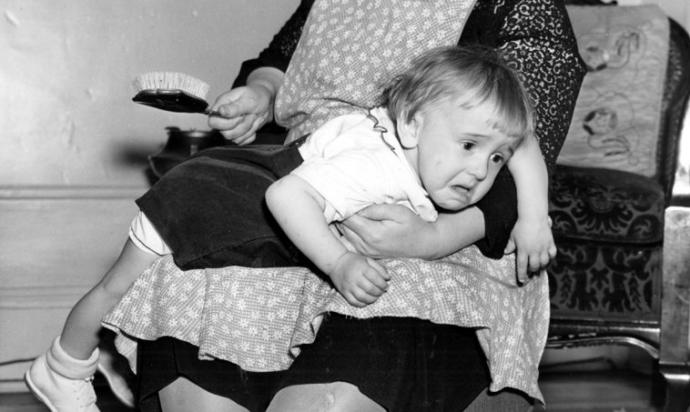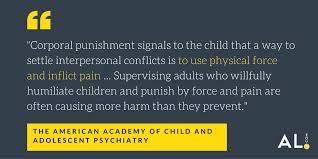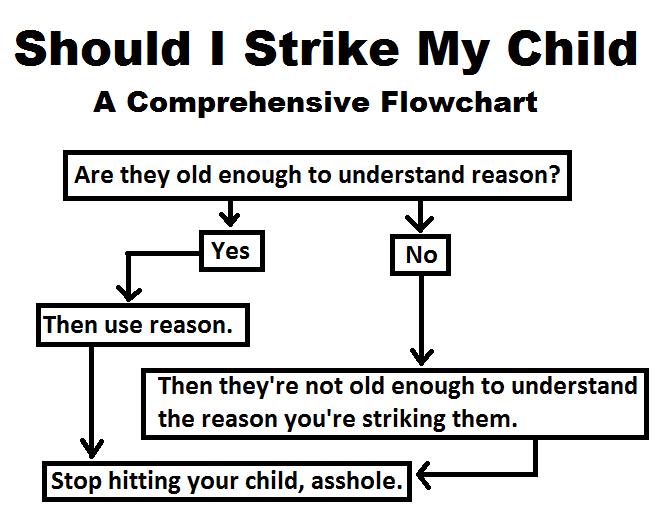This take is for those who deny facts like @SarahVanRensburg (as she deleted my comment where I explained with my own experiences, and what professionals like scientists and doctors say about how smacking/spanking is bad on her question Does spanking your child make you a bad parent? ) and for the rest who is ignorant about this matter.

Knox, like many mental health professionals, cites a strong correlation between corporal punishment and child abuse, noting that “…spanking is often the first step in the cycle of child abuse.”
The difference between physical punishment and physical abuse:
Physical punishment has been defined as “the use of physical force with the intention of causing a child to experience bodily pain or discomfort so as to correct or punish the child’s behavior” (Gershoff, 2008, p. 9). This includes: spanking, hitting, pinching, squeezing, paddling, whipping, ”whupping,” swatting, smacking, slapping, washing a child’s mouth with soap, making a child kneel on painful objects, and forcing a child to stand or sit in painful positions for long periods of time.
Physical abuse has been characterized by “the infliction of physical injury as a result of punching, beating, kicking, biting, burning, shaking, or otherwise harming a child” (Nat’l Clearinghouse on Child Abuse and Neglect, 2000, as cited in Gershoff, 2002, p. 540). Behaviors that cause pain but not physical injury are considered physical punishment, whereas behaviors that risk physical injury are termed physical abuse.
According to Gershoff, it's both bad and negatively affecting a child's development. Both physical punishment and physical abuse must be addressed and stopped. Alternatives exist which are more effective in enhancing the healthy development of children.
The Centers for Disease Control and Prevention (CDC) has just come out formally (2016) with statements that physical punishment is child abuse (p. 8) and that physical punishment should be banned (p. 46). This is a significant public health development.
Measurement research has supported the distinction between forms of corporal punishment that are relatively mild (e.g., spanking, slapping) and those more severe forms of physical aggression (e.g., physical assault) (Feigelman et al., 2009), each of which have been associated with distinct dysfunction later in life (e.g., Afifi et al., 2006).

I assume she deleted my comments, because she knows I am right, and here is why:
Corporal punishments increases a child's aggression:
“Spanking predicted increases in children’s aggression over and above initial levels [of aggressive behavior]” and “in none of these longitudinal studies did spanking predict reductions in children’s aggression over time” (p. 134). Instead, spanking predicted increases in children’s aggression (Gershoff, 2002; Gershoff & Grogan-Kaylor, 2013).
“Physical discipline, including spanking, is associated with increased aggressive behavior and lower self-esteem in children," says Brian Johnson, Professor of Counseling Psychology at the University of Northern Colorado and Co-author of WARNING SIGNS: How to Protect Your Kids from Becoming Victims or Perpetrators of Violence and Aggression. "Spanking models for children that using aggression is fine when one is upset or has a conflict. Spanking suppresses behavior quickly, but does not change it. Spanking also increases a child's anger, resentment, and desire to get revenge.""
“With each spanking, children experience physical pain as well as emotional pain as a sign that their parents don’t love them,”

Corporal punishment is ineffective:
The American Academy of Child and Adolescent Psychiatry, in a 2012 statement, concluded that: "Although corporal punishment may have a high rate of immediate behavior modification, it is ineffective over time, and is associated with increased aggression and decreased moral internalization of appropriate behavior."
"Within a few minutes, children are often back to their original behavior. It certainly doesn’t teach children self-regulation," Sege told NBC News.
“The effects of corporal punishment were transient: within 10 minutes, most children (73 percent) had resumed the same behavior for which they had been punished.”
Not only does hitting kids do little good; it can worsen their long-term behavior.
“Children who experience repeated use of corporal punishment tend to develop more aggressive behaviors, increased aggression in school, and an increased risk of mental health disorders and cognitive problems,” Sege said in a statement.
Alan Kazdin, the director of the Yale Parenting Center and a former president of the American Psychological Association, has called spanking “a horrible thing that does not work,”
Corporal punishment, impulsiveness, anti-social behavior and violence:
In 2011, the National Association of Pediatric Nurse Practitioners (NAPNA) issued a statement noting that: "Corporal punishment (CP) is an important risk factor for children developing a pattern of impulsive and antisocial behavior…[and] children who experience frequent CP… are more likely to engage in violent behaviors in adulthood."
Children spanked when they were as young as 15 months old displayed negative temperament and were less likely to show positive behaviors in the fifth grade and even into their teenage years, researchers at the University of Missouri say.
Verbal aggression can easily escalate into physical violence. Kids copy this behaviour and become aggressive sociopaths themselves. The Bobo doll experiment, created by Albert Bandura in 1961, proved that kids would copy any adult role model's behavior.
Other studies have found children who are corporally punished also experience academic problems in schools and cognitive deficits and were more likely to be violent toward women later in life.
Note that anti-social behavior is linked to cluster B.
Dr Catherine A Taylor (of Tulane University) and colleagues concluded in a 2010 review that: "Evenminor forms of corporal punishment, such as spanking, increase risk for increased child aggressive behavior."

Corporal punishment increases the risk of depression:
"Spanking naughty children increases their risk of depression and becoming hooked on illegal drugs, a new study confirms," the Mail Online reports.
''People who reported smacking were more likely to report having symptoms of depression, moderate to heavy drinking, street drug use, or having attempted suicide than those who didn't report having been smacked as a child.
Reports of child physical or emotional abuse were also linked with these outcomes.''
''It can lead to low self-esteem, brain damage, attention disorders and substance abuse, states the U.S. Department of Health and Human Services. It can lead to poor social skills, anxiety and depression when children reach adulthood.''
“Spanking really damages the parent-child relationship. It encourages the child to fear the parent as opposed to respecting the parent.”
Corporal punishment and development:
''The research clearly shows that spanking is related to an increased likelihood of many poor health, social and developmental outcomes. These poor outcomes include mental health problems, substance use, suicide attempts and physical health conditions along with developmental, behavioral, social and cognitive problems.
Equally important, there are no research studies showing that spanking is beneficial for children.
Those who say spanking is safe for a child if done in a specific way are, it would seem, simply expressing opinions. And these opinions are not supported by scientific evidence.''
More: https://www.verywellfamily.com/is-spanking-children-a-good-way-to-discipline-1094756
https://luvabi.wordpress.com/2015/08/09/spanking-lowers-your-childs-self-esteem/

Corporal punishment and intelligence:
Research from the University of New Hampshire even shows that spanking children affects their intelligence. A study presented in 2009 showed that kids who had parents that spanked had lower IQs four years later when compared to kids who were not spanked.
Experts theorize that this is because stress levels impact a child’s ability to learn and retain information, and a child who is spanked has higher stress and anxiety levels as they fear when they might be harmed next.
A 1998 study by Murray A. Straus and Mallie J. Paschall, titled "Corporal Punishment by Mothers and Child's Cognitive Development," revealed that children who were spanked were less able to keep up with the cognitive development level expected for their age. It can even lower their IQ, notes Psychology Today. Spanking can reduce a child's brain's grey matter, which is crucial since it influences learning abilities.
Spanking erodes developmental growth in children and decreases a child's IQ, a recent Canadian study shows.

Corporal punishments and Cluster B:
Inappropriate disciplinary techniques (such as corporal punishment), especially combined with inadequate emotional bonding with the parents, can result in children developing sociopathic tendencies.
The data documenting the associations between physical punishment and psychopathology and sociopathy are compelling. They can no longer be overlooked. Pioneering research has been conducted in this area over the past decade by Gershoff, Bitensky, Straus, Holden, Durrant, and others.
In this “parent effects model” negative parenting style is believed to influence a child’s antisocial behavior (Collins, Maccoby, Steinberg, Hetherington, & Bornstein, 2000; Maccoby, 2000; Moffitt, 2005). The few studies that have examined the relationship between parenting style and psychopathic personality have found evidence for an association between parenting style and children’s later psychopathic personality during adulthood.
''In addition, punitive discipline of all forms including physical punishment is also a predictor of antisocial risk (Farrington, 2007).
Sociopathy, as opposed to psychopathy, is the product of poor upbringing or environmental factors, rather than genetic ones; such environmental factors result in a very low sense of morality or conscience (Lykken, 2003).
The mind of an individual with psychopathy is organically configured such that he/she does not interact with society in expected ways, but for reasons related to neurological differences, whereas a sociopathic individual’s mind has learned how not to behave in socially acceptable ways.''
Lykken (1995) also stated that Sociopath reflects the socially learned aspect of these behaviors typically as a result of bad parenting whereas the Psychopath is believed to have been born that way.
Research has demonstrated that children who are abused physically or who are neglected tend to grow into offenders themselves. (Farrington, 2007).

I end this with, banning corporal punishment is good for society:
Youth around the world are less violent where corporal punishment is banned, according to an analysis of data from 88 countries, territories and protectorate states published Monday in the health journal BMJ.
"Societies that have these bans in place appear to be safer places for kids to grow up in," said lead study author Frank Elgar, an associate professor in the Institute for Health and Social Policy at McGill University in Montreal.
More: https://www.researchgate.net/publication/228152714_Banning_Child_Corporal_Punishment
Discipline means teaching, and sometimes that involves modeling behavior," such as using words to express disagreement and talking things out to find a solution, says Gershoff.

Conclusion.
These are the most important consequences of corporal punishment. There are more consequences like misanthropy, asocial, etc. There is literally no single benefit to hit your child. This isn't a matter of being a 'snowflake' as Sarah mentioned in her post, this is a matter of being mentally sane. People who use or would use corporal punishments towards their kids are bad parents and don't deserve to be parents at all. They're no better than anti-vaccination mothers. They're both damaging their child.
Yesterday I made a poll about how people would rather be punished as a child, and most people agreed with me that they prefer to be lectured and explained why it is wrong rather than corporal punished or emotionally punished. So why would we use corporal punishments for our kids? It isn't even slightly effective, but seriously damaging.
Some of you who had to face corporal punishments may say that you turned just out fine. I used to say the same, because I didn't know about the consequences nor realized that many of my traits are directly the result of the past. That was until I started my major and we had a whole course about bad parenting which includes spanking and anything I mentioned up, I realized I was left with the consequences, including certain cluster B traits. I don't want to go in the details, but before I realized it was linked to my childhood, I was already aware of who I was, I got worse with the time, soon enough I realized I wasn't normal and was going the wrong way but I never knew why, it took me years and so much effort to lessen certain traits which may have caused damage to others. My moral sense was surprisingly strong (maybe that had to do with my love for knowledge (it was my escape)) I knew I was becoming worse, my thoughts and everything was pretty terrifying.
You could just be not realizing it affected you in a way.
By the way, I study human development, my major highly discourages corporal punishment towards children and stand with that it should be banned.
If you still think corporal punishment is good after reading this, then :
A. You shouldn't have kids.
B. According to psychology, it's called cognitive dissonance which means: ''the mental discomfort (psychological stress) experienced by a person who holds two or more contradictory beliefs, ideas, or values. This discomfort is triggered by a situation in which a person’s belief clashes with new evidence perceived by the person. When confronted with facts that contradict beliefs, ideals, and values, people will find a way to resolve the contradiction to reduce their discomfort.''
C. Castration/sterilization would do you good.
The Canadian Paediatric Society, “strongly discourages [original emphasis] the use of physical punishment on children, including spanking.”
The American Academy of Pediatrics cautions that “corporal punishment is of limited effectiveness and has potentially deleterious side effects,”

@Pauliho I love you.
Most Helpful Opinions